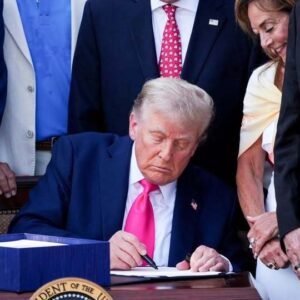New York City’s political landscape is about to shift dramatically. Mayor-elect Zohran Mamdani, a 34-year-old state assemblyman from Queens and a proud democratic socialist, is preparing to step into City Hall on January 1. His victory has energized progressives across the country, but it also places him squarely in the center of national debates over immigration, federal funding, and the future direction of the Democratic Party.
While the celebrations of his win are still fresh, Mamdani’s first real tests are already lining up — and they won’t wait for Inauguration Day.
A Campaign Built on the “Cost of Living Crisis”
From the very beginning, Mamdani made it clear what drives him: tackling what he calls the “cost of living crisis.” Standing on the steps of City Hall the night before the election, he told reporters that his first day as mayor would mirror his last day as a candidate — devoted entirely to easing the financial strain on New Yorkers.
He has positioned himself as a champion of working families, vowing to confront the rising costs of rent, childcare, and basic necessities that continue to squeeze middle- and lower-income residents. That message resonated deeply with younger voters and families across the boroughs who feel left behind by decades of economic inequality.
But turning that promise into policy will test both his leadership and political skill.
Confrontation on the National Stage
Even before taking office, Mamdani has drawn the attention — and ire — of national figures. Former President Donald Trump has repeatedly targeted him, labeling him a communist and claiming that New York City “will not survive” under his leadership.
Trump has even suggested the possibility of pulling federal funding from the city and hinted at deploying federal agents or the National Guard to counter Mamdani’s more progressive initiatives.
In response, Mamdani has said he’s willing to meet with the former president “any time” if it helps New Yorkers. But he’s also vowed to defend the city’s autonomy and values. He told Fox News that he’s ready to collaborate with Governor Kathy Hochul and Attorney General Letitia James to fight any potential funding cuts through the courts.
Big Promises and Even Bigger Price Tags
One of Mamdani’s signature proposals is universal free childcare for all children ages six weeks to five years. It’s a sweeping plan that would dramatically ease financial pressures for families — but also carry a price tag of up to $6 billion annually.
Governor Hochul, for her part, appears open to the idea. At a recent Queens event, she said she’s discussed the program with Mamdani and believes it’s achievable. Hochul has hinted that expanding childcare access will be a central theme of her upcoming State of the State address.
Mamdani’s other major promise — freezing rents on nearly one million rent-stabilized apartments — would have an immediate impact on tenants. The city’s Rent Guidelines Board, which the mayor appoints, sets annual rent adjustments. Under former Mayor Bill de Blasio, the board implemented rent freezes three times. Mamdani has made it clear that he intends to use that same authority aggressively to stop rent increases for struggling New Yorkers.
He’s also pledged to build 200,000 affordable housing units within the next decade — a goal that, while ambitious, will require cooperation across multiple agencies and the private sector.
A Divided Political Landscape
Despite his electoral win, Mamdani faces skepticism from key corners of city government. Many business leaders worry his progressive agenda could dampen economic growth or drive away investment. Others question whether his rent and housing policies will discourage new development at a time when the city desperately needs it.
In addition, Mamdani has few close allies within the City Council — a dynamic that could make advancing his initiatives more difficult. Building relationships and finding common ground will be essential if he hopes to turn campaign promises into real progress.
He’s expected to travel to Puerto Rico later this week to meet with council members attending an annual policy retreat — a critical step as the council prepares to elect a new speaker who could shape his legislative path.
Controversy and Image Repair
Mamdani’s rise hasn’t come without controversy. Throughout his campaign, he faced criticism for past remarks on Israel, with some religious leaders accusing him of contributing to a rise in antisemitic rhetoric. Rabbi Angela Buchdahl of Manhattan’s Central Synagogue said that his language had “helped mainstream some of the most troubling antisemitism.”
While Mamdani has pushed back on those accusations, saying his comments were rooted in calls for human rights, the controversy has made it clear that he will need to carefully manage how his words and actions are perceived as mayor of one of the world’s most diverse cities.
He has also sought to redefine his relationship with law enforcement. Once an outspoken advocate of “defunding the police,” Mamdani now says he wants to work with officers while also reforming how the city responds to mental health crises. He’s expressed respect for the challenges faced by officers and pledged to retain Police Commissioner Jessica Tisch to maintain stability in the department.
In an interview with The New York Times, he explained, “Beyond every headline and beyond every caricature, what I’ve found is a New Yorker simply trying to do the best that they can. I know that that is the case for N.Y.P.D. officers.”
A Vision for a New Kind of Safety
Among his early plans, Mamdani intends to create a new Department of Community Safety — an initiative designed to handle nonviolent emergencies with compassion and care. The department would dispatch trained mental health professionals, rather than police officers, to 911 calls involving people in crisis.
The proposal reflects his broader belief that public safety should be built on trust, prevention, and community support — not just enforcement. It’s a vision rooted in the idea that protecting New Yorkers means addressing the underlying causes of instability, from mental health to housing insecurity.
The Road Ahead
As January 1 approaches, Zohran Mamdani’s to-do list grows longer by the day. He faces the immense task of turning bold campaign ideas into sustainable policies — all while navigating political opposition, national scrutiny, and the everyday challenges of leading America’s largest city.
Whether he succeeds will depend not only on his vision, but also on his ability to bridge divides — between progressives and moderates, between city leaders and the federal government, and between his idealism and the realities of governance.
For now, New Yorkers wait — hopeful, cautious, and curious to see how this young, determined mayor-elect will shape the next chapter of their city.





